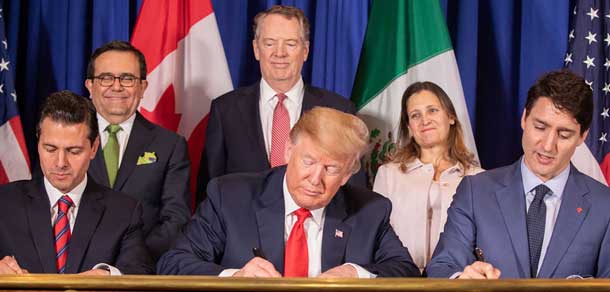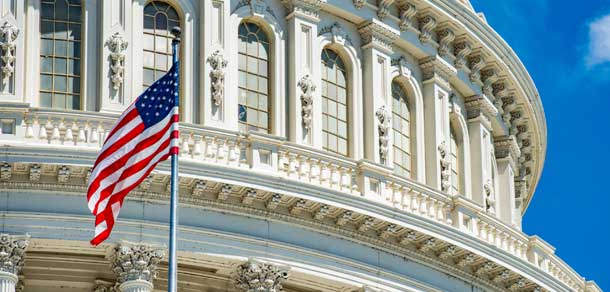APEGS ANNUAL MEETING TRACK SESSIONS
<
Professional Development Luncheon Keynote: Christopher Sands
As an American who has spent much of his life studying Canada, Christopher Sands comes off as a kind of hybrid. He initially seems Canadian and it’s not until he starts talking politics that you realize he’s American.
ands is a Senior Research Professor and Director of the Center for Canadian Studies at the Paul H. Nitze School of Advanced International Studies (SAIS), a graduate division of Johns Hopkins University in Baltimore. Sands teaches courses on federalism in North America and Europe, middle power diplomacy and an annual policy consulting practicum.
Sands’s keynote speech focused on political trends in Washington, particularly with regards to foreign and trade policy affecting Canada and other countries.
Get Used to Trump
Sands began by predicting that Donald Trump will be re-elected in 2020.
“I don’t say that to scare you. That’s just the reality of the pollical landscape in America. The economy is doing well. That’s always the baseline by which voters make their decisions. ‘Are you better off now than you were four years ago?’” Sands said.
“It is very unusual for Baby Boomer voters to deny a president a second term and those few occasions typically coincided with a recession or an unpopular war. We’re not in a recession and Trump has actually taken steps to pull America back from unpopular wars.”
Free Trade on the Ropes

Assuming that Trump will be around for a while, Sands said it was important for allies and trading partners like Canada to understand Trump’s vision on trade.
“There is no mystery to this. He has been very blunt about it. He does not like North American Free Trade Agreement (NAFTA). He does not like free trade.”
In this context, Sands emphasized that the new United States-Mexico-Canada Agreement (USMCA) is not a free trade agreement. Canadian politicians have tried to console themselves and the public by spinning the agreement as “NAFTA 2.0” but it is nothing of the sort.
“USMCA claws back a wide range of benefits to the United States. You may well feel that this is selfish and an inappropriate way to treat an ally but that’s the Trump vision on trade.”
USMCA in Quagmire
However, Sands predicts that USMCA will not be passed any time soon, if at all.
“There has long been an atmosphere of distrust and partisanship on trade in Washington. When Obama tried to negotiate the Trans-Pacific Partnership, the Democrats didn’t like free trade, the Republicans didn’t trust Obama, so he was very constrained in his trade mandate. These dynamics now apply to Trump and the USMCA.”
Before USMCA can even be introduced to Congress, it’s proponents have to establish its compliance with a laundry list of legislation such as environmental and labour regulations. After that, there are likely to be procedural delays from the Democrats. All of this, Sands said, makes it very unlikely that USMCA will be passed before the 2020 election.
China Policy
On the subject of Trump’s policies towards China, Sands had mixed reviews.
“There has been an assumption in academic and foreign policy circles that China’s ascendency is inevitable. By the sheer weight of numbers and social and economic trends, America will decline and China will eventually become the world’s dominant economic power,” Sands said.
“Trump rejects this and he confronts it head-on. Part of this, some have said, is that it seems to be part of the American DNA to always want to have an external enemy. Part of it as well is the brinksmanship that was typical of Trump’s business style.”
Sands thinks Trump may well succeed in turning back the tide of Chinese ascendency.
“People forget that Japan was once the second largest economy in the world. There were bold predictions back then that Japan would overcome the American economy. Where is Japan today?”
On the other hand, Sands is critical that the Trump administration has not done more to support Canada in the Meng Wanzhou case, where China is severely punishing Canada for holding the Huawei executive for extradition to the United States.
“The United States has an obligation not to leave its allies hanging. Canada is being punished not only for following rule of law but for doing what we asked you to do. The Trump administration has given a bit of lip service to this matter, but it needs to be taking strong action against China about this issue.”
Weakening the Alliance
This sort of behaviour is what Sands sees as the most destructive aspect of the Trump administration.
“The United States has forgotten how to rule as a leader, as a country that has its allies’ backs. This sends signals to China, Russia and others that they can push around America’s allies with impunity. In the long haul, that will only weaken American national security.”
No End in Sight
In his closing comments, Sands offered little hope for a change in the direction of American politics in the near term.
“If you look at the Democrats with their proposal for a ‘Green New Deal’, that movement will only lead to further radicalization in political discourse. People think American politics is too polarized now, but I predict that it will only grow more polarized. While that’s dangerous it also opens an avenue for hope. Perhaps it will just burn itself out. Perhaps the growing polarization will encourage the regular voters to come back towards the centre out of frustration that the politics of polarization isn’t getting anything done.”

